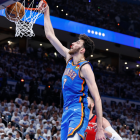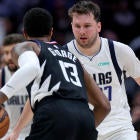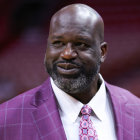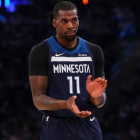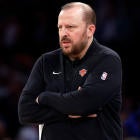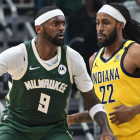With Stephen Curry, Kevin Durant, Blake Griffin, Kyle Lowry and Paul Millsap all signed, Gordon Hayward is the biggest free agent still on the market. He has taken meetings with three teams: The Boston Celtics, who wined at dined him Fenway Park-style, the Miami Heat, who brought out the big guns along with a really big poster of Hayward in a Heat uniform, and the incumbent Utah Jazz, who he met with Monday.
Hayward reportedly will make his decision Tuesday, a year to the day Kevin Durant announced his move to Golden State. Here are the pros and cons for each likely landing spot.
 Utah Jazz
Utah Jazz
PROS: Hayward has spent the first seven years of his career in Utah, and the Jazz really would be building something if he stays. Last year they cracked the 50-win barrier and made it to the second round of the playoffs, and there's also this:
For those reading tea leaves on Gordon Hayward, word is he told Jazz he wanted Rubio & would love to play w/ him
— Ramona Shelburne (@ramonashelburne) July 3, 2017
If you weren't aware, the Jazz recently traded for Ricky Rubio, who isn't much of a scorer but is a lights-out passer and a tough defender who will further bolster the NBA's best defense. In Utah, Hayward is looking at playing with a core of Rubio, all-NBA center Rudy Gobert, Derrick Favors, Joe Johnson (who was really big at times last year, particularly in the playoffs) and recently re-signed Joe Ingles. About Ingles, there's this from the the Salt Lake Tribune:
[Joe] Ingles is also a close friend of star small forward Gordon Hayward, who is currently an unrestricted free agent. The two share [Mark] Bartelstein as an agent and have forged a bond over the past few years
So Hayward reportedly wanted to play with Rubio, and Utah got him. Hayward is close friends with Ingles, and Utah kept him. Plus, Utah is in a manageable salary-cap situation moving forward. Even with Hayward on a max deal, the Jazz, who will have a decision to make on whether to re-sign Favors as a free agent, very reasonably could have room to add another max player or multiple solid players in 2018. The future is bright on paper. For Hayward, sticking around to see the team he's been so instrumental in shaping bear fruit is something neither of the other finalists can offer.
CONS: All the salary-cap room in the world doesn't do much good if you can't use it on anyone substantial, and aside from re-upping its own guys, when is the last time Utah signed a major free agent? They will have some trade flexibility, but there's a strong likelihood they remain stuck in that good-but-not-great, small-market class of the NBA with no direct route to the next step.
Making things more difficult, the Jazz are in the West, which has turned into an absolute basketball war zone with Paul George and Jimmy Butler defecting from the Pacers and Bulls. With those moves, Oklahoma City and Minnesota -- both of which finished behind Utah last season -- are lined up to compete for home-court in the first round. New Orleans, another team that missed the playoffs last year, has a pair of top-10 players in Anthony Davis and DeMarcus Cousins. They fell short of expectations last year after the trade deadline, but with more time together and Jrue Holiday re-signed, who's to say the Pelicans don't compete for a mid-seed playoff spot?
The harsh reality in the West is that Utah -- even with Hayward -- again could wins 50 games and play Golden State, San Antonio or Houston -- which just traded for Chris Paul -- in the first round. And that says nothing of Hayward's diminishing All-Star chances in the star-crowded West, if that matters to him. In the East -- with Boston or Miami -- it's almost assured he will have an easier path to the playoffs and would be a shoo-in All-Star.
 Boston Celtics
Boston Celtics
PROS: Let's start where we left off: The Celtics are in the East. If Hayward were to go green -- and barring injury -- Boston would be an obvious favorite to battle the Cavs again in the conference finals. The minute he signs, he's closer to a championship than he is in Utah. And, as noted, he's an All-Star lock in the East.
Even taking away the weaker-conference factor, Boston is in position to be the best team of Hayward's three options right away and for the duration of his contract. The Celtics are coming off a No. 1 playoff seed, and Danny Ainge has all kinds of avenues to improve the roster, with two potential top-five picks over the next two years and enough roster depth and versatility to make Boston a player in just about any trade-deadline scenario. A lineup including Isaiah Thomas, Al Horford, Avery Bradley, Jae Crowder and Hayward, with No. 3 overall pick Jayson Tatum, Marcus Smart, Jaylen Brown and Terry Rozier coming off the bench, is pretty darn good.
CONS: There's some skepticism that Hayward -- a terrific all-around player -- does not address Boston's biggest needs, which are rim protection and rebounding. Hayward's ability to take the scoring load off Thomas is a big deal, particularly in the playoffs. He's a guy who can get his own shot, but also is comfortable and effective playing as part of an ensemble offense.
From a basketball standpoint, there isn't a lot of downside to Hayward signing in Boston. Unless he doesn't want to live in Boston, doesn't love the idea of reuniting with college coach Brad Stevens or the loyalty pull of staying in Utah is too much, the Celtics make a lot of sense.
 Miami Heat
Miami Heat
PROS: Again, they're in the East, and Miami was one of the best teams in the league over the second half of last season. Pairing with Hassan Whiteside would give Hayward a similar inside-out dynamic to his run with Gobert in Utah. Maybe as enticing than anything is that Miami is always an attractive free-agent destination. With Pat Riley in charge, the Heat are always in position for serious runs at big-time players -- like they play they're making for Hayward.
That cannot be promised in Utah, or even Boston, which has been built primarily through the draft and trades. Al Horford is the only big free agent to sign there in a long time. Beyond that, there is no state income tax in Florida, and when you're pulling in as much money as Hayward would be, that adds up. And don't don't rule out the living-in-South Florida factor. Coming from Utah, that could look pretty good.
CONS: If the Heat were one of the best teams in the league over the second half of last season, they were one of the worst in the first half. You can't get excited about the finish and not worry about the start. The truth is, Miami is not a great team. Of Hayward's three options, the Heat currently put the worst team on the floor, by a pretty appreciable margin.
Yes, Miami is a team that always feels one step from a big turnaround, and getting Hayward could be that step. But a lot more has to go right in Miami for the Heat to contend than in Utah and Boston, places where Hayward knows he'll be on a really good team right away. Throwing out the South Beach sizzle factor and looking at the decision in basketball terms, it's hard to make a case for Miami over Boston. Utah has the benefit of an existing relationship with the player, but it resides in the tougher Western Conference.















